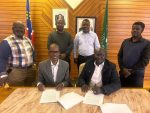Merger and acquisition (M&A) activity continues to emerge as a critical engine for growth in Namibia’s upstream oil and gas sector, as emphasized during a high-level panel discussion at the Namibia International Energy Conference (NIEC) on Thursday. Industry leaders outlined how strategic M&A deals are not only reshaping the country’s energy landscape, but also playing a key role in unlocking capital and accelerating exploration.
Gil Holzman, CEO of Eco Atlantic Oil & Gas, highlighted how acquisitions have underpinned his company’s expansion in Namibia since its entry into the market in 2009, stating: “Most of our best blocks are the result of M&As. Our most recent acquisition was in 2021 when we bought Azinam, which gave us promising blocks in the Orange Basin.”
According to Holzman, these acquisitions have fortified Eco Atlantic’s asset portfolio while positioning Namibia as an increasingly attractive frontier for global exploration. He pointed to M&A transactions involving supermajors such as ExxonMobil, QatarEnergy, Chevron and TotalEnergies as instrumental in bringing in not just capital, but also the technical capabilities needed to advance exploration in Namibia’s offshore and onshore basins.
Discussing the company’s operational strategy, Holzman emphasized a phased approach anchored in collaboration: “We aim to secure promising prospects, de-risk them internally and then attract partners with the technical know-how and capital required to unlock new frontiers.”
Echoing this sentiment, Adam Rubin, General Counsel at ReconAfrica, emphasized that M&As remain a strategic avenue to catalyze value creation, drive innovation and meet the substantial capital demands of upstream development. “We have not yet produced onshore, but the oil is there. Be patient – we will find it and produce,” he said, reaffirming the company’s commitment to moving from exploration toward full-scale production in the Kavango Basin.
Robert Bose, CEO of Sintana Energy, added that M&A activity has played a central role in enabling Sintana to broaden its asset base and build relationships with complementary partners. “M&As have helped us connect with the right partners and diversify our portfolio,” he said. “Cost-effective investment remains a key motivator, and we are focused on disciplined growth.”
From a financial perspective, Liz Williamson, Head of Energy at Rand Merchant Bank, outlined the opportunities that arise when IOCs divest from mature or late-life assets. She noted that such moves often create openings for mid-cap firms with fresh capital and a focused approach to step in. “This trend is beneficial for African governments, as middle-tier companies are often better suited to fully commit to and invest in these projects,” she explained.
Williamson also underscored the importance of establishing clear, investor-friendly deal frameworks and local content policies that buildinvestor confidence. “Not many African countries are currently securing significant foreign direct investment, and Namibia must maintain its appeal by offering clarity on local content laws,” she said.
As Namibia emerges as a key exploration hotspot on the continent, discussions around capital flows, deal-making and upstream expansion are set to continue at African Energy Week 2025: Invest in African Energies, taking place from September 29-October 3, 2025 in Cape Town. The event will unite industry leaders, investors and government representatives to advance dialogue, showcase project opportunities and drive strategic partnerships across Africa’s energy landscape. Namibia’s rising profile and recent exploration success will be a focal point, drawing increased attention from global stakeholders seeking entry into one of the continent’s most dynamic markets.










